June's Featured Collection Announced
All Eyes on Me
“Social Media is just the market’s answer to a generation that demanded to perform. So the market said ‘Here. Perform everything, all the time, to everyone, for no reason’. It is performer and audience melded together. It is prison…”
- Bo Burnham
Who are we when the camera is turned on us. Why do we idolize those who exist behind a screen. And, who are we when we’re the one in control of the camera? For nearly a century, filmmakers have been interested in both how celebrity affects people and impacts lives (eg Sunset Boulevard, All About Eve, A Star is Born, Network) as well as the power of the mind and voyeourism of the person behind the camera (Man With a Movie Camera, Blow Up, Body Double). But we live in an age where we are both audience and star in the modern social media landscape.
This month’s collection is a look at films that probe at where the line between audience and performer are blurred and where we have to ask ourselves, why do we want to see this life on display. “All Eyes on Me” explores how we behave so that we might one day be the center of attention, how our lives are put on display for the enjoyment of others, and most importantly, how we try to take control of how our life is perceived by those watching it unfold from behind a screen.
“…If you can live your life without an audience. You should do it”
- Bo Burnham
The Truman Show (1998)
Peter Weir

The Truman Show centers on Truman Burbank, whose life has been appropriated for television. Unbeknownst to Truman but known to everyone else, he stars in a worldwide reality show — an unending dramatic irony that exists entirely for him. In the midst of thousands of hidden cameras, actors, and a massive set, his life is orchestrated by God-director figure “Christof” for “24 hours a day, 7 days a week”. When The Truman Show aired in 1998 reality TV and the internet were in their infancy. 25 years later, it has proven prescient in our desires to watch the each other’s lives unfold.
While the film has been subject to dozens of interpretations ranging from “psychosis”, to Plato’s alegory of the cave, to a “culture of control”, it seems also to be a film about media and technology; more specifically, it serves as a warning for the coming age, coined by Shoshanna Zuboff, as the age of “surveillance capitalism”. In her book The Age of Surveillance Capitalism, Zuboff defines surveillance capitalism as “a new economic order that claims human experience as free raw material for hidden commercial practices of extraction, prediction, and sales”. In this new age, our life and experiences, our most intimate moments are harvested and put on display for the world for the profit of corporations. In this new age, we are Truman and the giant tech companies are Christof.
But perhaps this interpretation is too pessimistic. While deeply cynical of the world around us, The Truman Show finds deep empathy for Truman and reminds us that ultimately there is more joy in knowing ourself than watching and claiming to know someone else’s life.
“And in case I don’t see ya’. Good afternoon, good evening, and good night.”
EDtv (1999)
Ron Howard
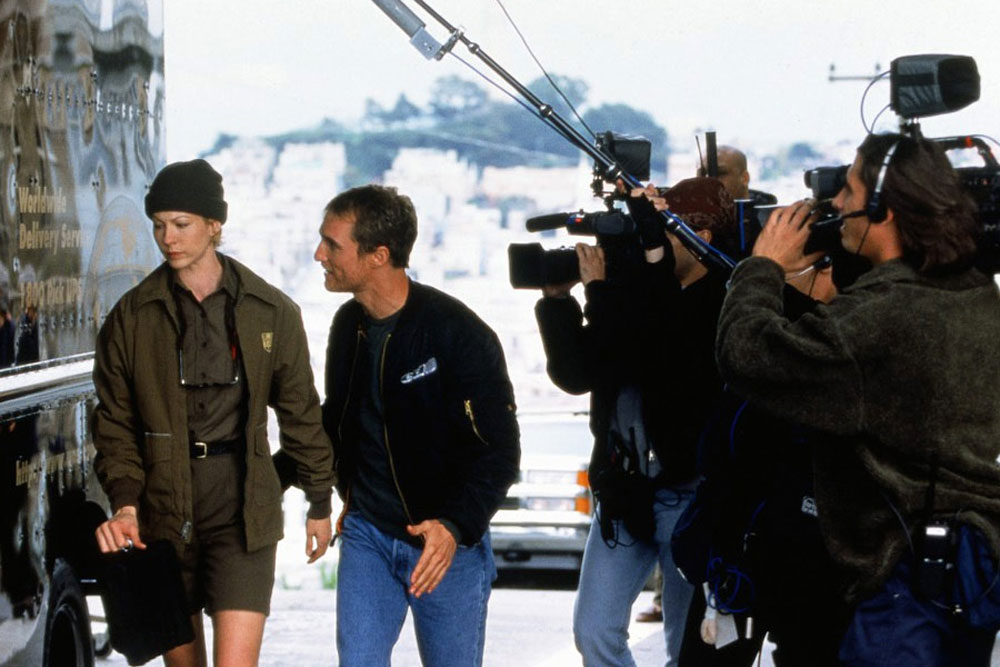
A forgotten relic of late 90s pop culture, EdTV is a flop 1999 comedy that probably came out ten years too early (In fact, the more successful version of this, the TV series Zach Stone is Gonna be Famous came out in 2014). In it, a young Matthew McConaughey plays Ed, a video store clerk who agrees to have a film crew follow him around at all times to create a new reality TV show. Sound familiar?
EdTV came out 9 months after The Truman Show and it is nearly impossible to find any mention of EdTV that doesn’t exist in the same breath as it’s classier and more artful cousin. The film made $35 million to its mind-boggling $80 million production budget before being banished to daytime HBO and disowned by its director and main star.
The Truman Show is the better movie, for sure, but EdTV has not received nearly the credit it deserves for its exploration of why we choose to put our life in the spotlight. By shedding the dramatic irony of the main character not knowing they are on camera, EdTV deals much more directly with the voyeurism that we choose.
Accidentally prescient in how reality tv would shape the tv landscape, why we become obsessed with celebrity, and how we claw to hold onto our five minutes of fame, EdTV is a fun exploration of why we watch what we watch - even when it’s our own life.
Eighth Grade (2018)
Bo Burnham
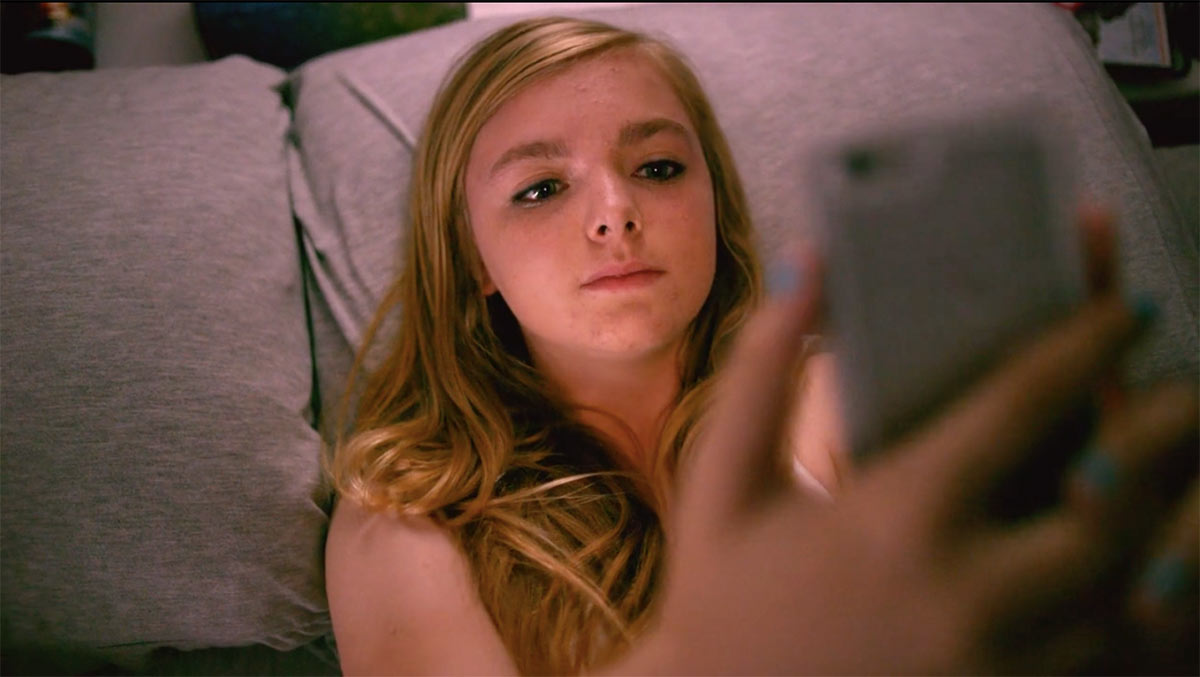
Around the same time that screens began to dominate our lives, a Sorkinesque trope emerged in entertainment: the gadget-glued teen who is cordoned off from a film’s narrative arc by a single set of earpods. Entire romances, violent struggles, and natural disasters have occurred in the background as a young person taps away on a screen, impervious to reality.
Eighth Grade is a refreshing take on growing up with social media that feels so real and earnest that at times it begins to feel like reliving the middle school experience (no this isn’t a horror movie).
The film follows Kayla, an anxious, uncomfortable teen girl who struggles at school to fit in and be heard. After school, she then comes home to make inspirational YouTube videos like “Be Yourself” or “Put Yourself Out There” for an audience of nobody.
We then see the digital and IRL life of Kayla unfold over the final week of middle school as Kayla navigates the challenges of growing up in this digital ecosystem.
It may be tempting to draw a binary between “YouTube Kayla” and the “real” Kayla, but Eighth Grade rejects such a reductive binary. Social media might be isolating, but for Kayla to completely exclude herself from it altogether would estrange her from her fellow teens even more. If she stops performing, she would seemingly cease to exist.
That Eighth Grade shows the ways in which our digital life in conflict or intertwined with our relationships suggests that what’s happening behind the lulling glow of the checked-out teen’s smartphone isn’t just mindless tapping, but a social exchange unlike any other. Burnham, a teen YouTuber turned filmmaker, knows this best.
Videodrome (1983)
David Cronenberg
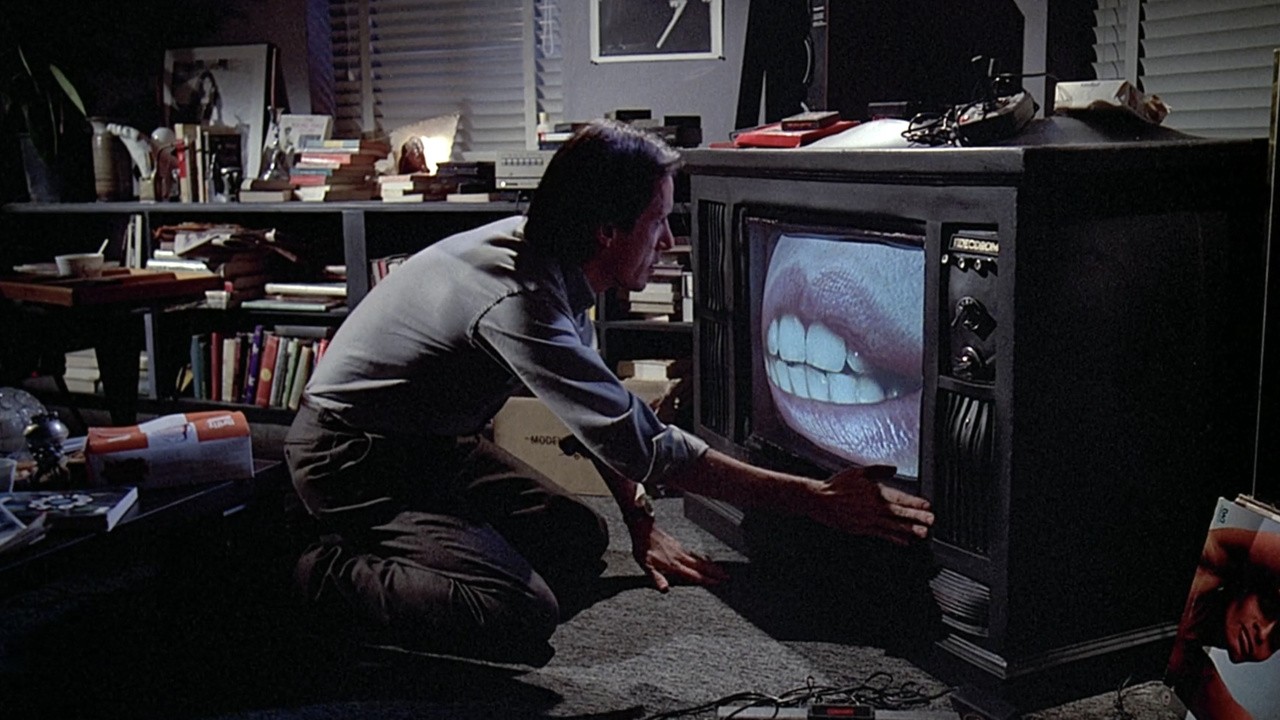
For those unfamiliar with the Cronenberg ouvre, the simplest description of Videodrome will sounds like a foreign language fever-dream. And that’s why we love it.
When Max Renn goes looking for edgy new material for his sleazy cable TV station, he stumbles across the pirate broadcast of a hyperviolent torture show called “Videodrome.” His attempts to unearth the program’s origins send him on a hallucinatory journey into a shadow world of right-wing conspiracies, sadomasochistic sex games, and bodily transformation.
The film posits a simple idea: a television show could alter our biology. It could distort the way we perceive the world, could blur the line between fiction and reality, between performance and self, and turn sick fantasies into acceptable behavior. Since 1983, Videodrome has seen the rise of YouTube, 4chan, the 24 hour news cycle, and the Dark Web.
Even the casting of Debbie Harry (iconic lead for Blondie) as Nicki represents the blurring of our performative self vs our true self. Her performance is every bit as edgy and cool as the New Wave persona she’d crafted with Blondie. When it turns out Nicki is a sexual submissive with an appetite for body modification Harry is playing a performance of the person her real-life stalkers imagined her to be: interested in sex with them, receptive to control, and open to flirting with skeezy losers like Max Renn.
Since Videodrome, Cronenberg has not steered away from his quest to probe at how our technological world will physically change us, but Videodrome stands as a powerful piece of sociological provocation that might change minds. It’s a looking glass. It’s a masterpiece.
“All hail the new flesh.”
Nightcrawler (2014)
Dan Gilroy
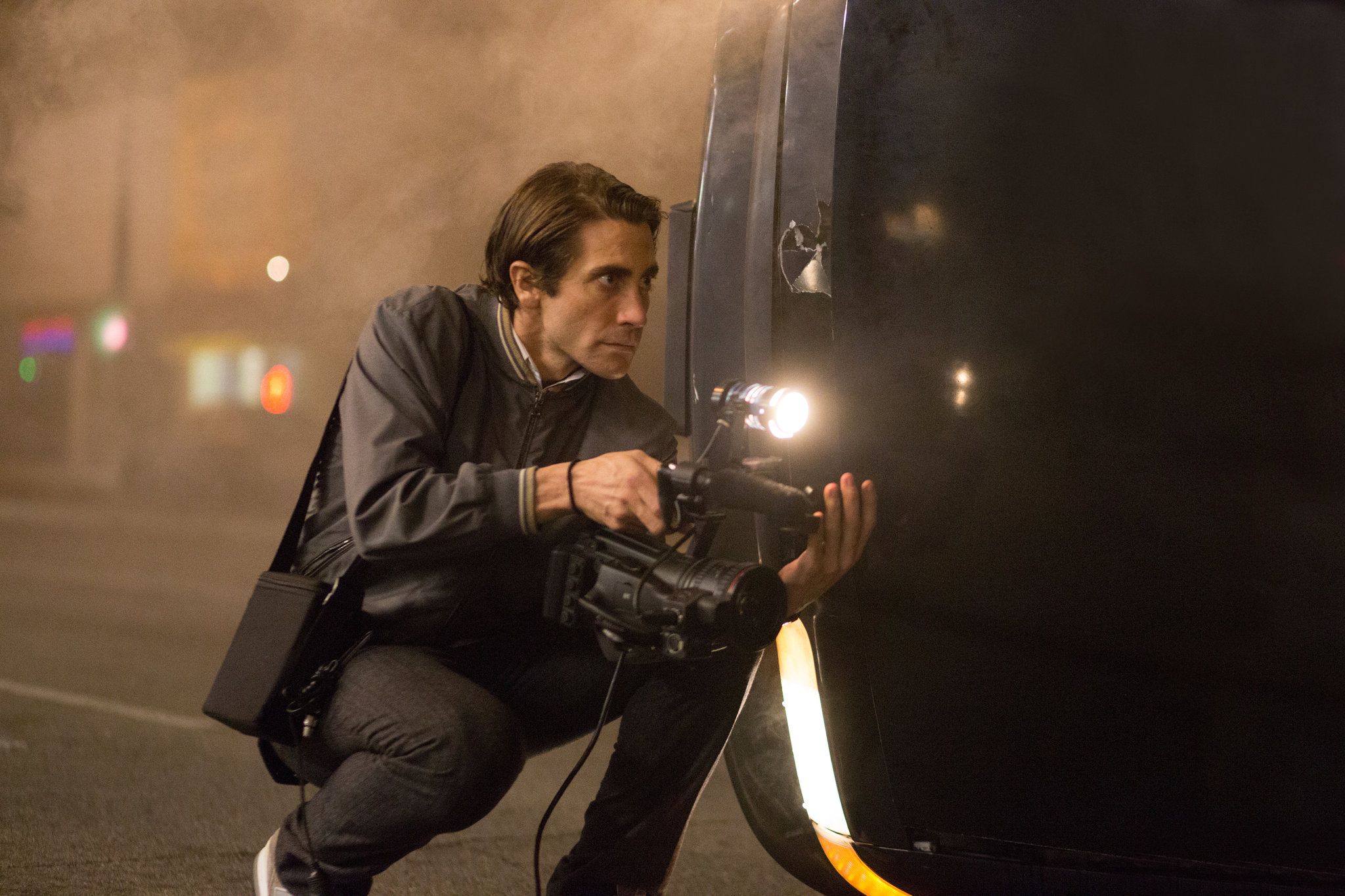
If you’ve ever posted on LinkedIn about how much you “love the grind” or that you have an “entrpeneurial mindset”, you might be a sociopath just like Jake Gyllenhaal’s Lou Bloom in Nightcrawler.
A stunning and chilling performance, Gyllenhaal portrays Lou Bloom, a troubled yet magnetitic and manipulative individual who connives his way into the life of a ‘stringer’, a roving, freelance crime photographer on the streets of crime-ridden L.A. Over time he blurs the line between observer and participant to become the star of his own story.
Nightcrawler is an exciting ride from start to finish and explores themes of “grind-culture”, media ethics, and voyeurism. If there is an anology to be found in Nightcrawler I think it is Bloom himself. Bloom is society. He is the cutthroat career ladder, he is the monetary driven decision making, he is hyper-ambition run amuck, he will do whatever it takes all with the goal of glorification of the self. But to be clear, nothing counts if he doesn’t get it on camera
“If it bleeds, it leads”
Dream Scenario (2023)
Kristoffer Borgli
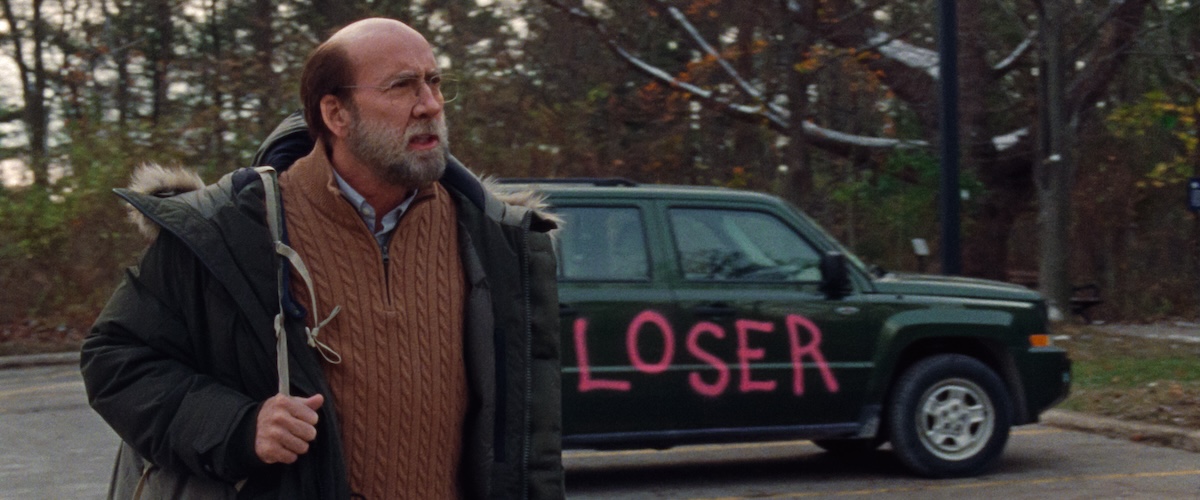
Nicolas Cage plays Paul Matthews in Dream Scenario, a middle-aged man with a PhD in evolutionary biology who teaches at a college—even though he’d much rather be publishing an educational book about ants. At home, he has a wife and two children.
On the surface, he lives a decidedly normal, average life.
Things take a strange turn when he starts showing up in people’s dreams, collectively around the world. No one knows why this is happening, but it quickly turns Paul into an overnight celebrity.
Paul gets what we all crave, virality. He is the focus of everyone’s attention, the star, and the film explores the costs of fame and celebrity. But this isn’t the film’s only theme. Underlying the surface level story is why we crave celebrity in the first place. Paul’s life is seemingly normal - mundane, but normal. He craved more, and got what we all think we want - more. I think the crux of Dream Scenario is not “How do we handle the attention”, it’s “Why do we think we want it in the first place”.
100% would love to get a beer with Paul Matthew’s and talk about kin selection
Other Features
- Blow up (1967)
- The King of Comedy (1982)
- Walk Hard: The Dewey Cox Story (2007)
- Project X (2012)